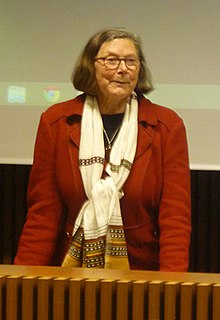Christiane Floyd
Christiane Floyd (born April 26, 1943 in Vienna ; née Christiane Riedl) is an Austrian computer scientist who was appointed to the TU Berlin in 1978 as the first female professor of computer science in the German-speaking region . She is considered a pioneer in computer science, opening up the view of software, which is exclusively fixed on technical aspects, to socio-technical issues. Floyd became known for continuously integrating ethical issues into the science and practice of computer science.
Life
Christiane Floyd grew up with her sister, who was two years older, alternating every six months between Vienna and her parents' estate in Lower Austria. Her mathematical talent was discovered even before she went to primary school. Following the wishes of her parents, from 1961 she studied mathematics at the University of Vienna as well as philosophy as a minor. For one year of her studies she stayed at the Ludwig Maximilians University in Munich and received a contract as a working student in the central laboratory of Siemens , where she also wrote computer programs. After her return to Vienna, she was awarded a Dr. phil. PhD.
In the same year she went back to Munich to work in the Siemens central laboratory on the development of the Algol 60 compiler for the Siemens 4004 until 1968 . From 1968 she worked as a research assistant at Stanford University on Edward Feigenbaum's Dendral AI project , and from 1973 to 1977 head of the method development department at Softlab in Munich , where she trained others in structured programming. She played a key role in developing the PET program development terminal system (later called Maestro I ), which was first presented in 1975 and installed around 22,000 times worldwide.
In 1978 she became the first woman in the German-speaking world to be a professor in the Computer Science Department at the TU Berlin . In 1991 she was offered a position at the University of Hamburg , where she headed the software technology department (SWT) in the computer science department until her retirement in December 2008.
Research priorities
Christiane Floyd helped shape the triumph of computerization and digitization through decades of scientific work. Without their influence, the hardware and software would be less application-related and people-friendly.
Her research included:
- Software development methods
- human-friendly design of computer-aided systems
- philosophical foundations of computer science
- Computer science and ethics.
She was critical of a purely “technology-reduced” approach to computer science and advocated close interlinking of development and application as well as the inclusion of the humanities and social sciences in computer science. This resulted in a special method for developing software: “Software technology for evolutionary and participatory system design” known as STEPS.
She had a long friendship with the cyberneticist Heinz von Foers , and his epistemological approaches influenced her scientific work.
She was actively involved in the implementation of the International Women's University "Technology and Culture" (ifu), which was founded on the occasion of the 2000 World Exhibition in Hanover as a university reform experiment by women for women, as dean of the Hamburg Women's University. She also appeared regularly as a lecturer at informatica Feminale in Bremen, as promoting and supporting women in IT was important to her.
Awards
- In 2012 she was appointed honorary professor at the Vienna University of Technology .
- In 2017 she received an honorary doctorate from the Faculty of Electrical Engineering, Computer Science and Mathematics at the University of Paderborn .
Private
She was married to Robert Floyd and Peter Naur - both also computer scientists - and have two children. She lives temporarily in Vienna and Berlin.
Christiane Floyd practices Christian meditation based on the Benedictine monk John Main and has been the 1st chairwoman of the Society for Christian Meditation since 2016.
Volunteering
Christiane Floyd has been involved in Ethiopia since 2000 . Inspired by the International Women's University “Technology and Culture” (ifu), she helps in Ethiopia to set up computer science studies and a doctoral program. She is also involved in a development cooperation project. In order to reduce maternal and child mortality, she and her Ethiopian team are developing info apps on the subject of safe birth.
She is also a member of the Forum Computer Scientists for Peace and Social Responsibility (FIfF) and supports the critical debate about how computer science affects society.
Publications (selection)
- Floyd, C., Reisin, F.-M., Schmidt, G .: STEPS to Software Development with Users. In: C. Ghezzi, JA McDermid (ed.): ESEC '89, Lecture Notes in Computer Science no. 387. Berlin, Heidelberg: Springer, 1989. pp. 48-64, 198 [1] PDF
- Floyd, C., Züllighoven, H., Budde, R., Keil-Slawik R. (Eds.): Software Development and Reality Construction. Springer Verlag, Berlin, 1992, ISBN 978-3-642-76817-0 .
- Software Development Process - Some Reflections on the Cultural, Political and Ethical Aspects from a Constructivist Epistemology Point of View. In: Cybernetics & Human Knowing - A Journal of second-order cybernetics autopoiesis and cyber-semiotics , Volume 6, No. 2, 1999. pp. 5-18, 1999.
- Christiane Floyd, Christian Fuchs, Wolfgang Hofkirchner (Hrsg.): Steps to the information society. Festschrift for Klaus Fuchs-Kittowski's 65th birthday . Peter Lang Verlag, Frankfurt a. M .; Berlin; Bern; Bruxelles; New York; Oxford; Vienna 2002, ISBN 978-3-631-37642-3 .
- Information and communication technologies for development - using the example of three projects in Ethiopia. In: Frank Fuchs-Kittowski ; Werner Kriesel (Ed.): Computer science and society. Festschrift for the 80th birthday of Klaus Fuchs-Kittowski . Frankfurt a. M., Bern, Bruxelles, New York, Oxford, Warszawa, Vienna: Peter Lang Internationaler Verlag der Wissenschaften, PL Academic Research 2016, ISBN 978-3-631-66719-4 (print), E- ISBN 978-3-653 -06277-9 (e-book).
literature
Anette Braun, Peter Eulenhöfer, Dirk Siefke u. a. (Ed.): Pioneers of computer science: Your life story in an interview. Springer, Heidelberg 1998, ISBN 978-3-642-58599-9 .
Web links
- Literature by and about Christiane Floyd in the catalog of the German National Library
- Christiane Floyd's website ( Memento from June 13, 2008 in the Internet Archive )
Individual evidence
- ↑ a b First German computer scientist Prof. Christiane Floyd receives an honorary doctorate from the University of Paderborn. University of Paderborn, February 11, 2017, accessed on June 8, 2020 .
- ↑ a b Anna-Kathrin Nezik: You have to reckon with her . In: The time . No. 8 , February 13, 2020, p. 32-33 .
- ↑ Despite the growing range, many wishes remain open. In: Computerwoche. December 8, 1989, accessed May 21, 2007 .
- ↑ a b Germany's first female computer science professor is (not) going to retire. heise online, November 25, 2008, accessed on June 11, 2020 .
- ↑ a b Da capo: In conversation: Christiane Floyd, software and information technology pioneer. ORF 1, May 29, 2020, accessed on June 11, 2020 .
- ^ A b René Wagner: Better social: The pioneer for open source was ... a woman. In: The Digisaur. September 12, 2016, accessed June 11, 2020 .
- ↑ a b Gero von Randow: Woman in contradiction. Computer scientist Christiane Floyd researches the effect of abstract codes . In: The time . No. 48 , November 20, 1992, pp. 50 .
- ↑ TU Vienna: Honor where honor is due! . Article from January 26, 2012, accessed on March 26, 2015.
- ↑ Peter Freese (Ed.): Awarding of an honorary doctorate to Prof. em. Dr. Christiane Floyd . Paderborn 2017
- ↑ Prof. em. Dr. Christiane Floyd receives an honorary doctorate from the University of Paderborn. University of Hamburg, October 30, 2017, accessed on June 11, 2020 .
- ^ Society for Christian Meditation eV: Society for Christian Meditation. Retrieved March 12, 2020 .
| personal data | |
|---|---|
| SURNAME | Floyd, Christiane |
| ALTERNATIVE NAMES | Naur-Floyd, Christiane; Riedl, Christiane (maiden name) |
| BRIEF DESCRIPTION | Austrian computer scientist, professor |
| DATE OF BIRTH | April 26, 1943 |
| PLACE OF BIRTH | Vienna |


